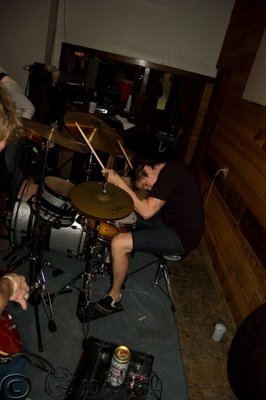Matthew Shipp. John Medeski. William Parker. Enough said.
But alas, you want more. The latest Thirsty Ear Records release, Scotty Hard’s Radical Reconstructive Surgery sees modern jazz powerhouses Shipp and Parker teamed with Medeski of Medeski, Martin, and Wood-fame. And while those three names may be familiar to many, Scotty Hard’s may not be. An acclaimed producer and remix wizard, Scotty Hard has worked with Wu-Tang Clan, MMW and most recently DJ Logic.
Rounding out the lineup for Radical Reconstructive Surgery are drummer Nasheet Waits (Antonio Hart, Michael Marcus) and DJ Olive, with additional drumming by Brazilian percussionist Mauricio Takara.
Medeski and Shipp haven’t shared a session since the two were students together at New England Conservatory of Music. Surprisingly, or maybe not, the duo dive into conversation like two old friends and throughout the record, Medeski’s organ effortlessly navigates the spaces around Shipp’s big, chunky piano chords.
Parker and Waits are generous in laying down beats for Medeski and Shipp to get lost in. Their rhythms provide space and get busy at the same time - a daunting task that only talents like these could pull off. The chameleon-esque Parker sounds amazing here playing the roll of Ron Carter on People’s Instinct Travels (A Tribe Called Quest) - jazz bass master fashioned as hip-hop head bopper. His ability to transition from abstract aural adventures with the likes of Hamid Drake and Peter Brotzmann to funky, on-the-corner jams with the Thirsty Ear fam makes Parker one of the most sought after bassists today and a true representative of the modern voice in jazz.
A brief introduction segues into the tempo-shifting, scatter brained opener “Chance Operation.” On “St. Clare’s Hospital,” Medeski plays the right hand to Shipp’s left.
“Joint Desease” begins with Shipp disjointedly wandering through the city lights, dodging a sonic assault of sirens and cries from the city at night. The drums here, for the first time on the record are DJ-produced and give the tune a New York circa 2012 vibe. Waits slowly and gently brings live drums in over DJ Olive’s MPC-processed beats while Medeski introduces his organ in a schizoid android fashion. The band brings a smoking groove beat back for “The General.”
Most of Radical Reconstructive Surgery sounds like John Medeski participating in a Thirsty Ear session, which, ostensibly, is the case. “Eclipse” however, sounds more like Matthew Shipp guesting on a Medeski, Martin and Wood record with a vibe far more reminiscent of MMW’s funk-filled vamps. Midway through “Eclipse” everything drops out and Shipp jumps in, pounding the keys with Cecil Taylor-like intensity.
“Eclipse” segues perfectly into the walking bass of “Cocktail.” Imagine two great pianists strolling the avenue after a few drinks, talking jive and arguing in loving fashion, stepping over each other and never letting the other finish a sentence. Then 1:20 later the conversation is over, neither one winning the argument.
The way Waits subdivides the beat on “The Peeler” is magnificent and “Anatomy of Melancholy” is again disjointed and angular in true Blue Series fashion. “Round Two” closes Shipp and Medeski’s Radical Reconstructive Surgery.
Bottom line: we want more!
